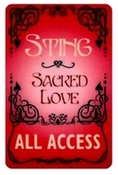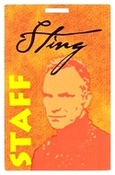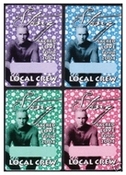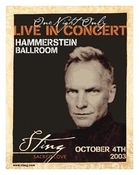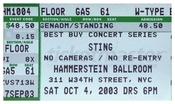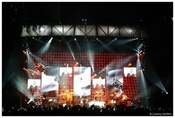
Sacred Love
Oct
4
2003
New York City, NY, US
Hammerstein Ballroomwith None
A Sense of Self and of the World...
Perhaps you've noticed, at some point during Sting's quarter-century of music-making, that the singer is more than a little bit full of himself. Perhaps you've noticed, too, that he has become one of pop music's most thoughtful multiculturalists. And perhaps you've wondered whether there's a connection.
On Saturday night Sting came to the Hammerstein Ballroom to play an elegant, appealing set celebrating his new album, 'Sacred Love' (A&M/Universal). He was supported by a small band, a roomful of diehard fans and enough casual self-confidence to put a dozen shrinks out of work.
If Sting enjoys being Sting, it's not hard to see why. He's a remarkably subtle singer, tossing off one jazz-inflected phrase after another, adding new twists to familiar vocal lines. And all night he nudged the music forward with coolly propulsive bass lines (occasionally switching to guitar), admirably resisting what must have been an overwhelming temptation to take a solo.
Sting's music updates the tradition of the blues-obsessed British rocker: he pioneered punky reggae with his band the Police, and since then he has broadened his scope, taking in everything from American R&B to Algerian rai. 'Sacred Love' includes collaborations with the flamenco singer Vicente Amigo, Mary J. Blige and Anoushka Shankar - Ravi Shankar's daughter and Norah Jones's half-sister.
Most pop stars ignore the music of the rest of the world, not because they think other musical traditions have nothing to offer, but because they don't dare dabble.
To acknowledge the vastness of the world's music is to risk feeling insignificant or unworthy. And so lots of pop stars stick to what they know, humbly declining to wander too far afield.
By contrast Sting is self-possessed enough to acknowledge so-called world music without getting lost in a multicultural quagmire, and his albums are proof that arrogance and generosity aren't incompatible. I'm one of the world's great singers, he seems to be telling his collaborators, and so are you.
On Saturday night not all of the musical voyages were worth the trip. There was a tedious gospel-lite composition called 'Whenever I Say Your Name'. And his new protest anthem, 'This War', didn't quite work: Sting's style is too lithe, too urbane, to conjure up political fervor of any sort.
But most of the new material succeeded, even though the audience members hadn't yet gotten around to learning the lyrics.
The songs on 'Sacred Love' tend to be verbose (the title track, for example, has 57 lines of lyrics) and gently propulsive; many sounded lighter and less solemn onstage. He dedicated 'Dead Man's Rope' to two friends who had recently died, but when he sang it he sounded almost sprightly, his voice dancing around a guitar ostinato.
The night ended with a handful of old favorites, including 'If I Ever Lose My Faith in You', a love song that also finds time to address the state of the world. And why not? Sting may be self-satisfied, but he's certainly not complacent. It's clear that he has spent lots of time pondering his place in the world, and who can blame him if he thinks he has figured it out?
(c) The New York Times by Kelefa Sanneh
Where is thy Sting?
Somebody should have told Sting to ditch the video accompaniment.
During most of the former Police man's concert at the Hammerstein Ballroom Saturday night, a troupe of nearly naked dancers gyrated on three rectangular screens at the back of the stage. They shared space with animated collages of Jewish kabbalistic symbols, Hindu and Celtic iconography, and the like.
Call it mystical soft porn.
Never mind that the background visuals frequently crossed the line between exotic and garish. Or that they offered further ammunition to the people who crack jokes about Sting's penchant for yoga and tantric sex.
The real problem was that the screens, clearly designed for a hall larger than the Hammerstein, distracted from the songs. And sadly, the songs - drawn mainly from Sting's latest album, 'Sacred Love' - didn't put up much of a fight.
A jazzy retooling of the Police chestnut 'Walking on the Moon' got the evening off to a promising start. But the excitement quickly ebbed.
Now 52 (he celebrated his birthday last Thursday), Sting still has one of the most glorious voices in pop. And every new song he played contained at least a hint of brilliance. But those hints were overwhelmed by glossy arrangements combining the worst in soft rock, lite jazz and potted world music.
Even the classics were tainted. 'Every Breath You Take' became a smarmy singalong, its original threatening undercurrent wholly discarded.
Only one tune emerged intact: 'Fragile', the moving 1987 ballad now inextricably connected to the events of 9/11. The tender performance was a welcome reminder of Sting's songwriting talent. Too bad about the rest of the show.
(c) The New York Daily News by Marc Randall
Intense love songs from stripped-down Sting...
Few entertainers have it. And, in fact, quiet power wasn't always a quality that Sting possessed. The brashness of his misspent youth has been recast over the years into a take-it-or- leave-it confidence that no longer has to shout to be heard.
Saturday night at his Hammerstein Ballroom gig, Sting displayed that power in a smoldering set of love songs that explored the multi-faceted concept of devotion.
There was lusty, passionate pillow talk, like what was dished up in 'Whenever I Say Your Name' and 'Let's Forget About the Future', and the longing for innocence in 'Never Coming Home'.
Other than the pleasing eye candy of the videos projected behind the band, the show had a stripped-down, no-frills quality that would have been as comfortable in any jazz club as it was at the Hammer.
Sting looked buff in a black tank top, like a spinach-fed Popeye. Still, this was a show all about the music. Sting sang, mostly played bass and sometimes picked an acoustic guitar. There were no antics, shenanigans or tricks. He was a songwriter singing from center stage, offering his music like a shopkeeper shows off his best apples.
As gripping as it was to watch the intensity in his furrowed brow and the tautness of his body as he sang tunes such as the very personal 'Book of My Life' and the heartfelt 'This War', it also felt natural to close your eyes and just listen to the concert as if it were radio in a darkened room.
At times, the show actually demanded that kind of close listening because the program ignored most of the man's hits, and instead was gleaned from his new album, 'Sacred Love', which was released last week.
For an established musician to ignore his best-loved, best-known material is the bravest, most foolhardy, thing he could do. You have to wonder why anyone - even Sting - would take a chance when they have so many sure-fire hit songs.
A quick answer is the satisfaction of the risk itself. Between the quality of the new 'Sacred Love' compositions and Sting's steely delivery, the concert was a success. He took a blind leap of faith, both on the songs themselves and his audience's openness to the new, and landed squarely on the ledge of greatness.
(c) The New York Post by Dan Aquilante
Perhaps you've noticed, at some point during Sting's quarter-century of music-making, that the singer is more than a little bit full of himself. Perhaps you've noticed, too, that he has become one of pop music's most thoughtful multiculturalists. And perhaps you've wondered whether there's a connection.
On Saturday night Sting came to the Hammerstein Ballroom to play an elegant, appealing set celebrating his new album, 'Sacred Love' (A&M/Universal). He was supported by a small band, a roomful of diehard fans and enough casual self-confidence to put a dozen shrinks out of work.
If Sting enjoys being Sting, it's not hard to see why. He's a remarkably subtle singer, tossing off one jazz-inflected phrase after another, adding new twists to familiar vocal lines. And all night he nudged the music forward with coolly propulsive bass lines (occasionally switching to guitar), admirably resisting what must have been an overwhelming temptation to take a solo.
Sting's music updates the tradition of the blues-obsessed British rocker: he pioneered punky reggae with his band the Police, and since then he has broadened his scope, taking in everything from American R&B to Algerian rai. 'Sacred Love' includes collaborations with the flamenco singer Vicente Amigo, Mary J. Blige and Anoushka Shankar - Ravi Shankar's daughter and Norah Jones's half-sister.
Most pop stars ignore the music of the rest of the world, not because they think other musical traditions have nothing to offer, but because they don't dare dabble.
To acknowledge the vastness of the world's music is to risk feeling insignificant or unworthy. And so lots of pop stars stick to what they know, humbly declining to wander too far afield.
By contrast Sting is self-possessed enough to acknowledge so-called world music without getting lost in a multicultural quagmire, and his albums are proof that arrogance and generosity aren't incompatible. I'm one of the world's great singers, he seems to be telling his collaborators, and so are you.
On Saturday night not all of the musical voyages were worth the trip. There was a tedious gospel-lite composition called 'Whenever I Say Your Name'. And his new protest anthem, 'This War', didn't quite work: Sting's style is too lithe, too urbane, to conjure up political fervor of any sort.
But most of the new material succeeded, even though the audience members hadn't yet gotten around to learning the lyrics.
The songs on 'Sacred Love' tend to be verbose (the title track, for example, has 57 lines of lyrics) and gently propulsive; many sounded lighter and less solemn onstage. He dedicated 'Dead Man's Rope' to two friends who had recently died, but when he sang it he sounded almost sprightly, his voice dancing around a guitar ostinato.
The night ended with a handful of old favorites, including 'If I Ever Lose My Faith in You', a love song that also finds time to address the state of the world. And why not? Sting may be self-satisfied, but he's certainly not complacent. It's clear that he has spent lots of time pondering his place in the world, and who can blame him if he thinks he has figured it out?
(c) The New York Times by Kelefa Sanneh
Where is thy Sting?
Somebody should have told Sting to ditch the video accompaniment.
During most of the former Police man's concert at the Hammerstein Ballroom Saturday night, a troupe of nearly naked dancers gyrated on three rectangular screens at the back of the stage. They shared space with animated collages of Jewish kabbalistic symbols, Hindu and Celtic iconography, and the like.
Call it mystical soft porn.
Never mind that the background visuals frequently crossed the line between exotic and garish. Or that they offered further ammunition to the people who crack jokes about Sting's penchant for yoga and tantric sex.
The real problem was that the screens, clearly designed for a hall larger than the Hammerstein, distracted from the songs. And sadly, the songs - drawn mainly from Sting's latest album, 'Sacred Love' - didn't put up much of a fight.
A jazzy retooling of the Police chestnut 'Walking on the Moon' got the evening off to a promising start. But the excitement quickly ebbed.
Now 52 (he celebrated his birthday last Thursday), Sting still has one of the most glorious voices in pop. And every new song he played contained at least a hint of brilliance. But those hints were overwhelmed by glossy arrangements combining the worst in soft rock, lite jazz and potted world music.
Even the classics were tainted. 'Every Breath You Take' became a smarmy singalong, its original threatening undercurrent wholly discarded.
Only one tune emerged intact: 'Fragile', the moving 1987 ballad now inextricably connected to the events of 9/11. The tender performance was a welcome reminder of Sting's songwriting talent. Too bad about the rest of the show.
(c) The New York Daily News by Marc Randall
Intense love songs from stripped-down Sting...
Few entertainers have it. And, in fact, quiet power wasn't always a quality that Sting possessed. The brashness of his misspent youth has been recast over the years into a take-it-or- leave-it confidence that no longer has to shout to be heard.
Saturday night at his Hammerstein Ballroom gig, Sting displayed that power in a smoldering set of love songs that explored the multi-faceted concept of devotion.
There was lusty, passionate pillow talk, like what was dished up in 'Whenever I Say Your Name' and 'Let's Forget About the Future', and the longing for innocence in 'Never Coming Home'.
Other than the pleasing eye candy of the videos projected behind the band, the show had a stripped-down, no-frills quality that would have been as comfortable in any jazz club as it was at the Hammer.
Sting looked buff in a black tank top, like a spinach-fed Popeye. Still, this was a show all about the music. Sting sang, mostly played bass and sometimes picked an acoustic guitar. There were no antics, shenanigans or tricks. He was a songwriter singing from center stage, offering his music like a shopkeeper shows off his best apples.
As gripping as it was to watch the intensity in his furrowed brow and the tautness of his body as he sang tunes such as the very personal 'Book of My Life' and the heartfelt 'This War', it also felt natural to close your eyes and just listen to the concert as if it were radio in a darkened room.
At times, the show actually demanded that kind of close listening because the program ignored most of the man's hits, and instead was gleaned from his new album, 'Sacred Love', which was released last week.
For an established musician to ignore his best-loved, best-known material is the bravest, most foolhardy, thing he could do. You have to wonder why anyone - even Sting - would take a chance when they have so many sure-fire hit songs.
A quick answer is the satisfaction of the risk itself. Between the quality of the new 'Sacred Love' compositions and Sting's steely delivery, the concert was a success. He took a blind leap of faith, both on the songs themselves and his audience's openness to the new, and landed squarely on the ledge of greatness.
(c) The New York Post by Dan Aquilante




